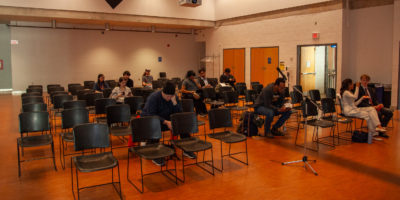By Stephanie Cesca
Ryerson’s teaching assistants are beginning efforts to unionize this week, but their attempts to organize are facing a major obstacle — disorganization.
It’s been difficult finding TAs at Ryerson because nobody on campus represents them,said Derek Blackadder, a Canadian Union of Public Employees representative organizing the TA’s union campaign.
CUPE representatives are being forced to search Ryerson’s halls, classrooms and cafeterias, randomly asking people if they’re TAs.
“What we do, sometimes frankly, is stand up on a chair and say, ‘Is anyone here a teaching assistant?’” Blackadder said.
A contingent of Ryerson RAs approached CUPE Local 3904 hoping to form a union to negotiate with administration for higher wages and job security.
The unionization effort comes on the heels of labour strife at York University. About 2,100 contract faculty and teaching and research assistants went on strike Oct. 26, forcing the cancellation of tutorials and some classes.
Contract negotiations between university administrators and striking workers resumed Monday and were expected to continue until Wednesday.
York’s teaching assistants are demanding a four per cent raise each year for the next two years. York administration have offered a two per cent raise.
In order to hold a vote to starts a union at Ryerson, CUPE must get 40 per cent of the school’s TAs to sign a union card — a difficult task when they don’t even know where to find them.
According to Ryerson’s human resources department, the university presently employs 209 TAs, but the number varies from semester to semester.
“It’s not the simplest thing in the entire world,” said Angela Ross, CUPE’s staff representative at Ryerson.
If 40 per cent of the TAs agree to sign a card in support of union representation, CUPE will submit a request to the Ministry of Labour and hold a vote. If at least 50 per cent of the total numbers of TAs vote to form a union, they will officially be represented by CUPE.
“They don’t have a lot to lose,” Ross said of Ryerson’s TAs. “They really are the lowest paid.”
She said unionized TAs at other universities earn between $25 and $40 per hour, but non-unionized universities such as Ryerson pay between $12 and $15 per hour.
A contract is also beneficial, Blackadder said, because it outlines exact job requirements both in and outside the classroom.
Joe Tam, a computer science teaching assistant, said he would like to see a union formed at Ryerson because of the potential benefits.
“I’m a visa student,” he said. “I’m paying a lot for tuition, about $12,000 per year.”
On top of that, he said he earns $15.50 an hour as a TA.
“I’m quite okay with that,” he said. “But I wouldn’t mind getting more.”
Despite the possible benefits, engineering teaching assistant Lucas Szajek said he’s not signing a card because he doesn’t think unions effectively represent their members.
“I totally hate unions,” he said. “I don’t believe in what they do. All they care about is the union dues.”
Although union dues vary at each university because each local determines its dues, Blackadder said, all members have to pay 0.85 per cent of their wages to the main CUPE office.









Leave a Reply